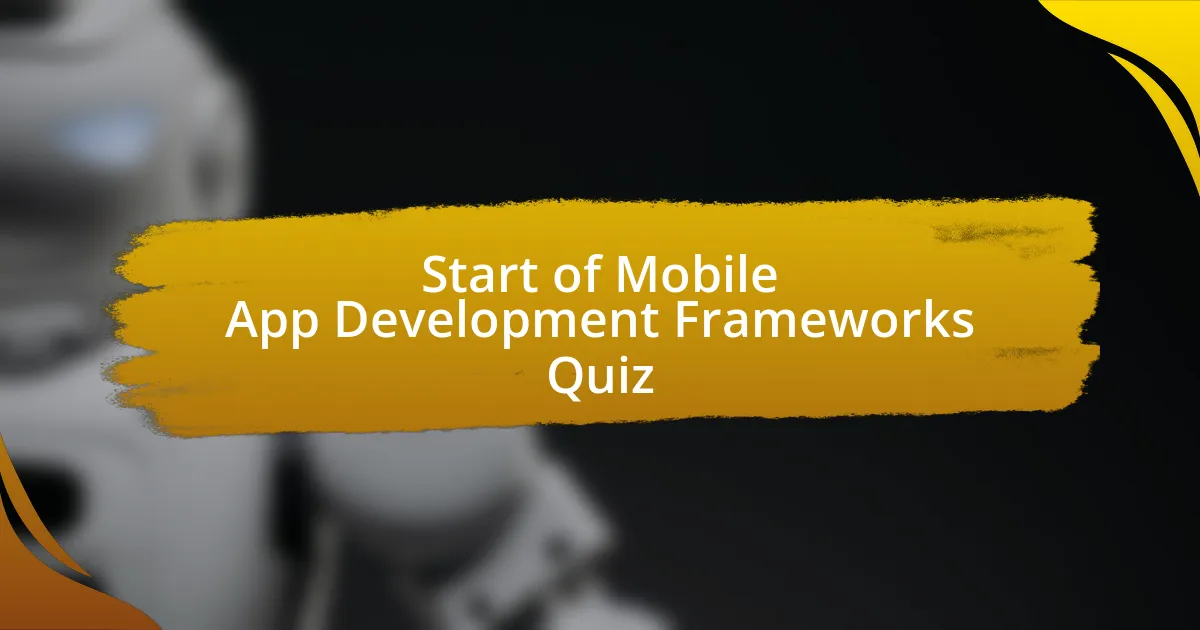
Start of Mobile App Development Frameworks Quiz
1. Which framework is recognized for developing mobile apps with a single codebase across iOS and Android?
- Framework7
- Xamarin
- Flutter
- Ionic
2. What programming language is primarily used in Flutter for mobile app development?
- JavaScript
- Python
- C++
- Dart
3. Which mobile app development framework offers a variety of pre-built UI components and is suitable for hybrid applications?
- Corona SDK
- Flutter
- Xamarin
- Ionic
4. What key feature does React Native provide for developers focusing on mobile app performance?
- Comprehensive testing environment
- Native performance and UI components
- Command-line interface for coding
- Web browser compatibility
5. Which framework is particularly known for its support of Angular within hybrid app development?
- Xamarin
- React Native
- Flutter
- Ionic
6. What is the primary development language used in Xamarin for cross-platform mobile applications?
- Python
- C#
- Ruby
- JavaScript
7. Which framework allows mobile developers to use Dart programming language?
- Xamarin
- React Native
- Flutter
- Ionic
8. What is the main advantage of using the Flutter framework in mobile app development?
- Requires separate code for each platform
- Single codebase for multiple platforms
- Only supports iOS development
- Focuses solely on web applications
9. Which mobile app development framework is based on Apache Cordova and is known for its rich UI components?
- React Native
- Ionic
- Cordova
- Flutter
10. In which type of application is Xamarin predominantly used?
- Angular
- Swift
- React
- Xamarin
11. What essential capability does Vue Native enable for developers during the app development process?
- Automated deployment processes
- Increased app storage efficiency
- Enhanced graphics rendering capabilities
- Real-time testing and debugging of the app
12. Which framework is best known for its extensive libraries and high customizability in mobile apps?
- Xamarin
- Flutter
- Framework7
- Corona SDK
13. What is a common disadvantage of hybrid frameworks like Ionic in mobile app development?
- Seamless integration with web-based technologies
- Rich UI component library for customization
- Suboptimal performance compared to native frameworks
- Extensive third-party packages available
14. Which mobile app framework is famous for its `hot reload` feature that speeds up development?
- Corona SDK
- Xamarin
- Flutter
- Ionic
15. What is the core programming language utilized in the development of Android apps with Kotlin?
- Java
- C++
- Python
- Ruby
16. How does Framework7 differentiate itself from other mobile app development frameworks?
- Xamarin
- Ionic
- React Native
- Framework7
17. What are the advantages of using JavaScript in mobile app development frameworks?
- Requires multiple codebases for different platforms
- Slower performance than native apps
- Cross-platform compatibility and reusable code
- Limited access to device features
18. Which framework is explicitly designed for Progressive Web Applications (PWAs)?
- Angular
- Vue.js
- Ionic
- React
19. What major company is the creator of both Flutter and the Dart programming language?
- Oracle
- IBM
- Microsoft
20. What primary feature of Xamarin aids in the development of apps designed for multiple platforms?
- Shared codebase
- Separate projects
- Native user interfaces
- Platform-specific APIs
21. Which framework is particularly suited for building applications that require real-time updates?
- Bootstrap
- Angular
- Socket.IO
- jQuery
22. What is the main backend technology integrated with Ionic for building mobile applications?
- React
- Angular
- Vue
- Ember
23. Which popular mobile app development framework allows developers to write once and deploy on both iOS and Android?
- Flutter
- Xamarin
- Ionic
- Corona SDK
24. What notable UI approach does React Native use to compose mobile interfaces?
- Component-based architecture
- Grid layout system
- Flexbox positioning
- Layered design
25. Which framework’s ecosystem supports instant feedback for developers through efficient debugging tools?
- Xamarin
- Ionic
- Vue Native
- Framework7
26. What is the primary use of Objective-C in the context of mobile app development?
- Java
- Ruby
- Python
- Objective-C
27. Which mobile development framework emphasizes native-like performance while using web technologies?
- Xamarin
- Framework7
- Flutter
- Ionic
28. What unique feature does Corona SDK offer that differentiates it from other mobile app frameworks?
- Requires Java for all apps
- Only supports Android devices
- Limited to web applications only
- Uses Lua scripting for rapid development
29. Which tools are commonly used with Xamarin to facilitate debugging and testing?
- IntelliJ IDEA
- Code::Blocks
- Visual Studio
- NetBeans
30. How does the community contribute to the development and improvement of the Ionic framework?
- The community does not influence software updates
- Community-driven contributions like plugins and resources
- Community members focus solely on design aspects
- Only the Ionic team develops the framework

Congratulations! You Have Successfully Completed the Quiz
Well done on completing the quiz on Mobile App Development Frameworks! It’s clear that you took the time to engage with the material, and that effort is commendable. Whether you answered every question correctly or learned something new, the experience has added to your understanding of this vital topic in technology.
Throughout the quiz, you may have discovered various frameworks and their unique advantages. Perhaps you learned about popular options like React Native, Flutter, and Xamarin. This knowledge can help you choose the right tools for your own app development projects. Understanding these frameworks enhances your ability to create efficient, user-friendly mobile applications.
To deepen your knowledge further, we invite you to explore the next section on this page. It offers valuable insights and detailed information about Mobile App Development Frameworks. Dive in to expand your understanding and explore best practices that can elevate your app development skills. Happy learning!

Mobile App Development Frameworks
Overview of Mobile App Development Frameworks
Mobile app development frameworks are software platforms that provide developers with the tools and libraries needed to create mobile applications. They streamline the development process by offering pre-built components and functionalities, reducing the need for extensive coding. Frameworks often support multiple platforms, such as iOS and Android, allowing for cross-platform development. This enables developers to write code once and deploy it across various devices, enhancing efficiency. Popular frameworks include React Native, Flutter, and Xamarin, each with unique features and capabilities.
Types of Mobile App Development Frameworks
Mobile app development frameworks can be categorized into three main types: native, cross-platform, and hybrid. Native frameworks, like Swift for iOS or Kotlin for Android, provide the highest performance and access to device features. Cross-platform frameworks, such as React Native and Flutter, allow developers to write applications that run on multiple platforms with a single codebase. Hybrid frameworks, like Apache Cordova, combine elements from both native and web applications, enabling developers to leverage web technologies for mobile app development.
Benefits of Using Mobile App Development Frameworks
Using mobile app development frameworks offers numerous advantages. They significantly accelerate the development process due to reusable components and pre-existing libraries. This leads to reduced development costs and shorter time-to-market for applications. Frameworks often include built-in tools for testing and debugging, enhancing code quality. Additionally, they facilitate easier maintenance and updates, as a single codebase can serve multiple platforms. The community support for popular frameworks also provides developers with abundant resources and shared knowledge.
Key Features of Popular Mobile App Development Frameworks
Popular mobile app development frameworks come with distinctive features that cater to different development needs. React Native excels in creating responsive user interfaces with its component-based architecture. Flutter stands out with its rich set of customizable widgets and fast performance due to native compilation. Xamarin offers a robust integration with .NET, enabling developers to leverage existing C# knowledge and code libraries. These features contribute to their widespread adoption and effectiveness in developing high-quality mobile applications.
Future Trends in Mobile App Development Frameworks
The future of mobile app development frameworks is poised for innovation driven by several trends. The demand for cross-platform solutions continues to rise, fostering the growth of frameworks like Flutter and React Native. Additionally, advancements in artificial intelligence and machine learning are being integrated into frameworks, allowing for smarter, more personalized applications. As 5G technology expands, frameworks will need to adapt to leverage increased data speeds and capabilities. The trend toward low-code and no-code development platforms is also emerging, catering to a broader audience beyond traditional developers.
What are Mobile App Development Frameworks?
Mobile app development frameworks are software tools that provide a structured environment for developing mobile applications. These frameworks typically include libraries, APIs, and a development environment to streamline the creation of apps for mobile devices. Popular frameworks include React Native, Flutter, and Xamarin. Studies show that using frameworks can reduce development time by up to 30% when compared to native development.
How do Mobile App Development Frameworks work?
Mobile app development frameworks work by offering pre-written code and libraries to handle common tasks, thus speeding up the development process. They provide templates, user interface components, and tools for connecting to databases and APIs. For instance, React Native allows developers to write code in JavaScript and translates it into native components, enabling cross-platform compatibility.
Where are Mobile App Development Frameworks primarily used?
Mobile app development frameworks are primarily used in the creation of mobile applications for smartphones and tablets. They cater to both Android and iOS platforms, allowing developers to build apps that can function on multiple operating systems from a single codebase. According to Statista, around 70% of developers choose cross-platform frameworks to reach a wider audience.
When did Mobile App Development Frameworks emerge?
Mobile app development frameworks started emerging around the early 2010s, coinciding with the rise of smartphone usage. The introduction of frameworks like PhoneGap in 2011 allowed developers to create applications using HTML, CSS, and JavaScript. As mobile technology evolved, more sophisticated frameworks such as React Native were released, enhancing capabilities for developers.
Who benefits from Mobile App Development Frameworks?
Businesses, developers, and end-users benefit from mobile app development frameworks. Businesses save on development costs and time while reaching more customers with cross-platform apps. Developers gain efficiency and ease of use, making project management simpler. End-users enjoy high-quality applications that perform well on their devices. Reports indicate that businesses can see a return on investment of up to 300% from properly developed mobile apps.
















